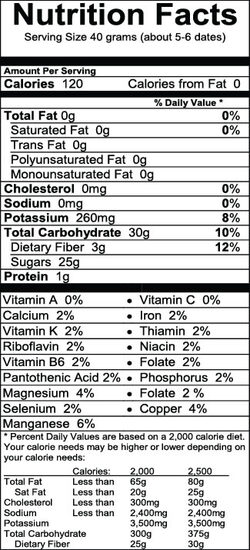Health & Nutritional benefits of dates
Wonderfully delicious, some think a super food - dates are one of the most popular fruits packed with an impressive list of essential nutrients, vitamins, and minerals
- They replenish energy & revitalize the body instantly - to break the fast during Ramadan they are served - personally if I got hunger pains - couple dates will get you thru to the next main meal - ideal to snack on.
- With the high amount of processed foods (low in fiber) we eat - good addition with 4 dates containing 25% of the recommended daily allowance of fiber.
- Iron - dates are an excellent source of iron, with iron being a component of hemoglobin inside red blood cells this helps the oxygen-carrying capacity of the blood - 0.90mg/100g of fruit
- Potassium - containing 16% of daily recommended levels of this electrolyte - 100 g contains 696 mg - Potassium is a mineral that's crucial for life. Potassium is necessary for the heart & Kidneys plus other organs to work normally
-
Date fruits are also rich in minerals like calcium, manganese, copper, and magnesium. Calcium is essential for strong bones and teeth, also playing a crucial role in other systems of the body, such as the health and functioning of nerves and muscle tissue. Manganese is an essential element involved in formation of bone, also involved in the metabolism of carbohydrate, cholesterol and amino acids. Copper is required for the production of red blood cells and Magnesium is an essential mineral required by every organ in the body for a range of activities including bone, protein and fatty acid formation.
-
They contain health benefiting flavonoid polyphenolic antioxidants known as tannins. Tannins are known to possess anti-infective, anti-inflammatory, and anti-hemorrhagic (prevent easy bleeding tendencies) properties.
-
They are moderate sources of vitamin-A (contains 149 IU per 100 g), Vitamin A is a fat-soluble vitamin which helps maintain normal reproduction, vision and immune function. Consumption of natural fruits rich in vitamin A is known to help protect from lung and oral cavity cancers.
-
They compose antioxidant flavonoids such as B-carotene, lutein, and zea-xanthin. These antioxidants found to have the ability to protect cells and other structures in the body from harmful effects of oxygen-free radicals. Thus, eating dates found to offer some protection from colon, prostate, breast, endometrial, lung, and pancreatic cancers.
-
Zea-xanthin is an important dietary carotenoid that selectively absorbed into the retinal macula lutea, where it thought to provide antioxidant and protective light-filtering functions. It thus offers protection against age-related macular degeneration, especially in elderly populations.
-
Further, the fruit has moderate levels of B-complex group of vitamins as well as vitamin K. It contains very good amounts of pyridoxine (vitamin B-6), niacin, pantothenic acid, and riboflavin. These vitamins are acting as cofactors help body metabolize carbohydrates, protein, and fats. Vitamin K is essential for many coagulant factors in the blood as well as in bone metabolism.
Why do people eat dates during Ramadan
Being a staple food of the Middle East, having been cultivated for thousands of years. Dates are known as the food the Prophet Muhammad ate when he broke from his fast, besides the heath benefits dates give, dates have special place in Islam.
Eating large amounts of food immediately after fasting is not healthy for the body, dates being an excellent source of fiber, sugar, magnesium, potassium and have carbohydrates help maintain health during Ramadan.
